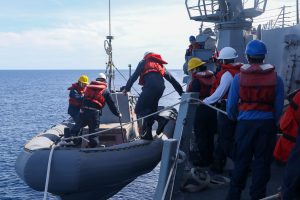China’s military said yesterday that it had conducted routine patrols in the South China Sea, a day after the United States and other nations announced the completion of joint maritime exercises in the Philippines’ exclusive economic zone (EEZ).
In a statement announcing the Chinese patrols, a spokesperson for the Southern Theater Command of the People’s Liberation Army (PLA) called on the Philippines to cease “provoking incidents” in the disputed waterway, Reuters reported.
“We sternly warn the Philippine side to immediately stop provoking incidents and escalating tensions in the South China Sea, as well as bringing in external forces for backing such efforts that are destined to be futile,” the spokesperson said. “Any attempt to stir up trouble or disrupt the situation will not succeed.”
The PLA warning was issued a day after the United States, Japan, and the Philippines completed joint maritime exercises in the Philippines’ EEZ in an unspecified region of the South China Sea. In a statement yesterday, the U.S. Indo-Pacific Command said that the “maritime cooperative activity” took place from September 11 to 13, in order to demonstrate “a collective commitment to strengthen regional and international cooperation in support of a free and open Indo-Pacific.”
It added, “The U.S., along with our allies and partners, upholds the right to freedom of navigation and overflight and other lawful uses of the sea and international airspace, as well as respect to the maritime rights under international law.”
Yesterday’s PLA statement was consistent with – indeed, nearly identical to – dozens of similar statements that have been issued following confrontations between the two nations’ coast guards over the past few years. Beijing has also routinely condemned Manila’s conduct of joint patrols and exercises with close partners and allies. Sure enough, while the drills were ongoing, the state-run tabloid Global Times cited a military source who accused the Philippines of “rall[ying] external countries to stir up trouble in the South China Sea through a so-called ‘joint patrol’.” It added that the PLA’s Southern Theater Command “monitored and maintained vigilance throughout the process, keeping the situation fully under control.”
Both of these actions took place against a backdrop of growing tension in the South China Sea, particularly over Scarborough Shoal, a triangular atoll that lies around 222 kilometers from the coast of the Philippines’ Luzon island. The feature has been under de facto Chinese control since a protracted stand-off between the two countries in 2012, and has been the focus of frequent incidents in recent years, most of them involving Chinese efforts to prevent Filipino fishermen from accessing the shoal’s internal lagoon.
The area was the site of a dramatic incident on August 11, in which two Chinese vessels – a PLA Navy warship and a China Coast Guard patrol vessel – collided with each other while pursuing a Philippine patrol boat seeking to supply fishermen at the atoll. The Philippine Coast Guard claimed that the collision resulted in substantial damage that rendered the patrol vessel “unseaworthy.” (The Chinese government did not officially acknowledge the collision.)
In a possible retaliation, China’s State Council last week approved a proposal to establish a national nature reserve at Scarborough Shoal, a move that would provide Beijing with a legal pretext to tighten its control over the disputed atoll. describing it as “an important guarantee for maintaining the diversity, stability and sustainability of Huangyan Island’s natural ecosystem.” Tellingly, it also called for stronger enforcement against “illegal activities” at the reserve.
The Philippines expressed its strong opposition to the plan, lodging a formal diplomatic protest and describing it as “illegitimate and unlawful.” Western governments have also roundly condemned the plan. U.S. Secretary of State Marco Rubio added his voice to this chorus over the weekend, slamming China’s “destabilizing plans” for the disputed feature.
“Beijing claiming Scarborough Reef as a nature preserve is yet another coercive attempt to advance sweeping territorial and maritime claims in the South China Sea at the expense of its neighbors,” Rubio said in a statement.
































